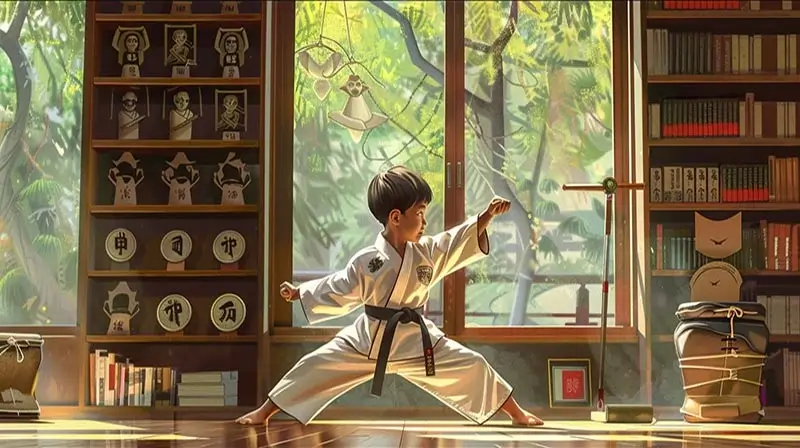Secrets to Success: How Kids Excel in Martial Arts and Academics
We all know kids excel in martial arts and academics through a unique blend of discipline, focus, and goal-setting. Martial arts help build confidence and resilience, as earning new belts showcases dedication.
This structured practice translates to better study habits, turning sessions at the dojo into motivation for tackling homework. With the help of supportive peers and mentors, children learn teamwork and develop social skills, enhancing their academic performance. By setting clear, achievable goals, they pave the way for success in both fields.
So, get ready to discover more about how this powerful connection can reveal potential!
Key Takeaways
The Role of Discipline in Martial Arts Education
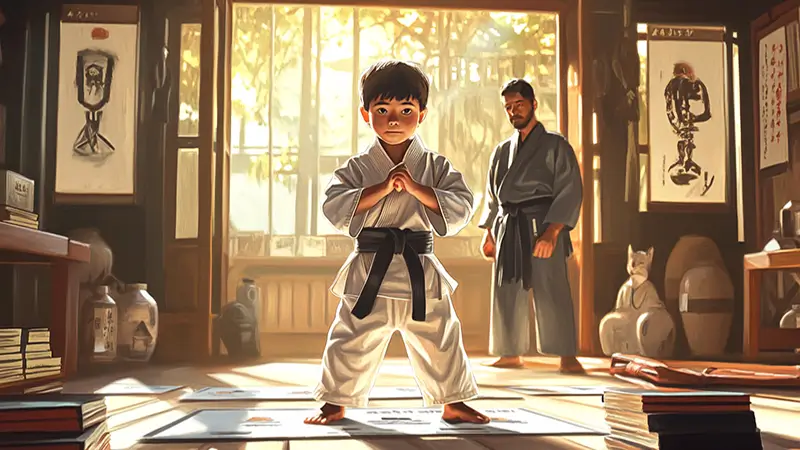
As we investigate the impact of martial arts on our development, it’s clear that discipline plays a vital role in this journey. When we step onto the mat, we quickly learn that discipline isn’t just about following rules; it’s about cultivating self-control, focus, and respect. These qualities empower us, allowing us to break through our limitations, whether in martial arts or academics.
In our training, we face challenges that require consistent effort and dedication. Each time we tie our belts, we’re reminded of the commitmentwe’ve made to ourselves. This commitment fosters a sense of responsibility, helping us prioritise our time and energy wisely.
For instance, when we practice a new technique repeatedly, we develop patience and perseverance, skills that translate directly into our schoolwork.
Moreover, disciplined training teaches us to set goals. By aiming for higher belts or mastering specific moves, we learn how to plan and achieve objectives, which is essential for academic success.
As we adopt the discipline of martial arts, we improve our physical abilities and equip ourselves with life skills that guide us toward freedom and success in all areas of life.
Martial Arts and Child Development
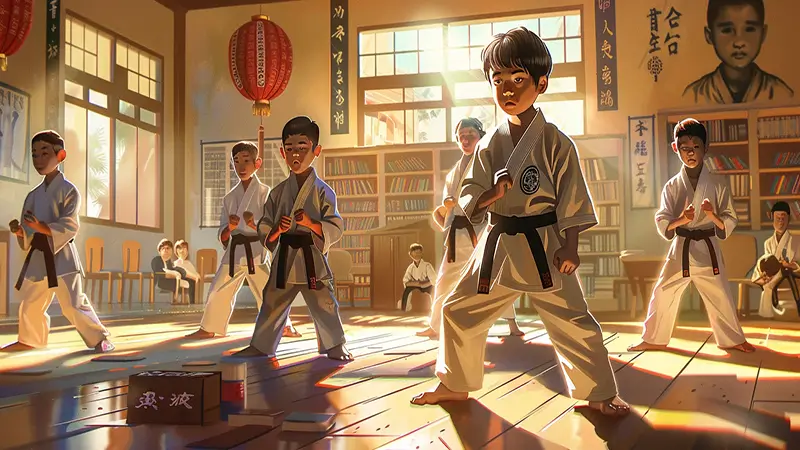
From an early age, we can see how martial arts positively impact child development. Engaging in martial arts helps kids boost their confidence, improve their social skills, and elevate their focus. When we step onto the mat, we learn to set goals and work hard to achieve them. This process encourages a sense of accomplishment that spills over into our academic lives.
Moreover, martial arts teaches us to respect ourselves and others. We build friendships with peers who share our passion, creating a supportive community. Through teamwork and shared experiences, we learn the importance of collaboration and communication, skills that are essential in school and beyond.
Additionally, the physical activity involved in martial arts keeps us healthy and energised. Regular practice helps us develop strength, flexibility, and balance, making tackling other activities, including sports and academic challenges, easier.
Research shows that physical activity can improve brain function, which means we’re training our bodies and minds as well.
In short, martial arts provide a unique blend of physical and mental benefits that contribute to a well-rounded childhood, setting us up for success in both martial arts and academics.
Cognitive and Physical Benefits for Young Learners
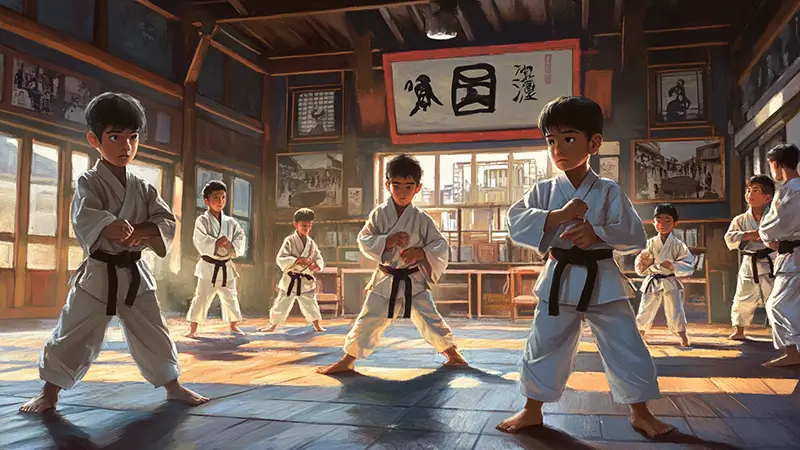
When we think about martial arts, it’s exciting to realise how much it can boost our focus and discipline.
Not only do we learn to concentrate better in class, but we also get a great workout that improves our physical fitness.
Enhanced Focus and Discipline
While many might think of martial arts as just a physical activity, they actually cultivate improved focus and discipline in young learners. When we practice martial arts, we engage our minds as much as our bodies.
A dojo’s structured environment teaches us to pay attention, listen to instructions, and follow directions carefully. This heightened awareness can spill over into our everyday lives, helping us concentrate better in school.
Discipline is another significant benefit we gain through martial arts training. Each class requires us to commit to our practice, respect our instructors, and work hard toward our goals.
For instance, earning a new belt is a tangible reminder of our dedication and effort. This sense of achievement builds our self-confidence, encouraging us to tackle challenges in academics with the same determination.
Research shows that students with strong focus and discipline tend to perform better in school. By embracing martial arts, we learn self-defence and equip ourselves with essential skills that lead to success in all areas of life.
Improved Physical Fitness
How can martial arts improve our physical fitness? When we step onto the dojo mat, we’re not just learning to punch and kick but also building strength, flexibility, and endurance.
The dynamic movements in martial arts require us to engage our entire bodies, promoting cardiovascular health and muscle tone. As we practice techniques, we develop coordination and balance, which can boost our overall athletic performance.
Research shows that regular physical activity, like martial arts, boosts our metabolism and helps us maintain a healthy weight. It’s not just about the body; these workouts can also sharpen our minds.
When we train, we learn to push our limits, which fosters resilience and determination. This perseverance translates into other areas of our lives, including academics.
Plus, martial arts social aspect helps us connect with peers, building teamwork skills and a sense of belonging.
Building Self-Esteem and Respect Through Martial Arts
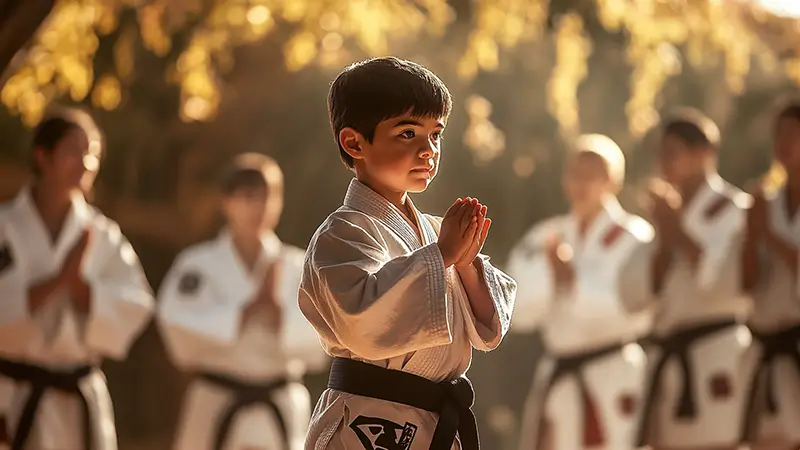
Martial arts offer a unique pathway for individuals to build self-esteem and respect for themselves and others. Through our training, we learn that every kick, punch, and form is more than just a technique; it’s a step toward personal growth.
We discover that respect isn’t just about following rules but valuing ourselves and those around us.
Here are some key ways martial arts help us grow:
- Empowerment: We gain confidence as we achieve new skills and earn belts.
- Discipline: Regular practice instills a sense of responsibility and commitment.
- Community: We form bonds with our peers, supporting each other’s journeys.
- Conflict Resolution: We learn to handle disagreements respectfully and assertively.
- Self-Reflection: We’re encouraged to regularly evaluate our actions and attitudes.
As we progress in martial arts, we find ourselves more capable of facing challenges on and off the mat.
The respect we cultivate in the dojo translates to our daily lives, helping us interact kindly with friends, family, and our school community.
Together, we’re not just becoming martial artists; we’re becoming confident individuals ready to tackle the world.
Enhancing Focus and Perseverance in Academics

When we plunge into our studies with the same intensity we bring to our martial arts training, we can significantly improve our focus and perseverance. Just like in martial arts, where we practice techniques repeatedly to master them, applying this mindset to our academic tasks helps us stay engaged and dedicated.
By setting aside specific times for studying, we create a routine that helps us focus better. We can treat our study sessions like martial arts classes, immersing ourselves fully and eliminating distractions. For instance, if we’re tackling math problems, we can approach them with the same determination we use when learning a new kick.
Moreover, perseverance is key. Just as we don’t give up after a tough sparring match, we shouldn’t throw in the towel when our homework gets challenging. Instead, we can break down difficult subjects into smaller, manageable parts. This strategy not only makes learning less overwhelming but also builds our resilience.
By embracing these practices, we foster a mindset that champions both academic success and personal growth, paving the way for a brighter, more fulfilling future.
Let’s harness our martial arts spirit to soar in our studies!
Goal Setting: The Bridge Between Martial Arts and Academics
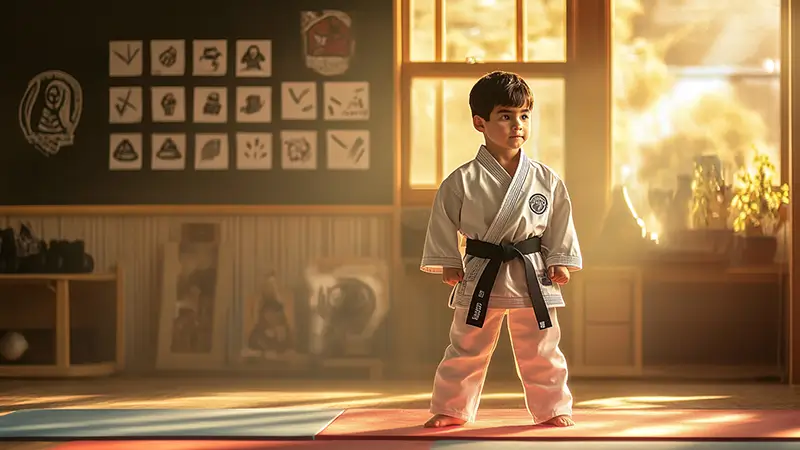
Setting goals is essential in martial arts and academics, as it helps us stay focused and disciplined.
By creating SMART goals — specific, measurable, achievable, relevant, and time-bound—we can chart a clear path to success.
Let’s look at how this approach boosts our dojo performance and academic achievements!
Achieving SMART Goals
Achieving our goals through a structured approach can significantly improve our martial arts training and academic performance. One effective method we can use is SMART goals. This means making our goals Specific, Measurable, Achievable, Relevant, and Time-bound. By doing this, we gain clarity and motivation, helping us stay focused on what truly matters.
Here are some key points to reflect on when setting our SMART goals:
- Specific: Clearly define what we want to achieve, like earning a new belt or raising our grades.
- Measurable: Set criteria to track our progress, such as practising three times a week or studying for an hour daily.
- Achievable: Verify our goals are realistic and attainable, like mastering a particular technique before testing for a belt.
- Relevant: To keep us engaged, we should align our goals with our passions, whether it’s martial arts or academics.
- Time-bound: Set deadlines to create a sense of urgency, like aiming to complete a project by the end of the month.
Discipline and Focus
Success in both martial arts and academics hinges on our ability to cultivate discipline and focus. When we commit to our training or studies, we discover that these qualities become our greatest allies.
In martial arts, discipline helps us master techniques, while focus allows us to stay present during practice. Likewise, in academics, discipline encourages us to stick to our study schedules, and focus helps us absorb information effectively.
To bridge the gap between these worlds, we can set specific goals that reflect our ambitions. For instance, if we aim to earn a higher belt, we can simultaneously set a target to improve our grades. By prioritizing both areas, we create a “cycle of motivation” that fuels our drive.
Research shows that kids who practice discipline tend to perform better academically as they learn to manage their time and energy wisely.
Let’s remember, achieving our goals doesn’t happen overnight. It takes consistent effort and a willingness to push through challenges.
Frequently Asked Questions
What Age Is Best for Kids to Start Martial Arts Training?
We believe starting martial arts training around ages 4 to 6 offers kids the chance to develop coordination and discipline. It’s an exciting time for them to investigate movement while having fun and building confidence.
How Can Parents Support Their Child’s Martial Arts Journey?
To support our child’s martial arts journey, we can encourage their passion, attend classes together, celebrate their achievements, and create a positive environment. Let’s foster resilience and confidence, empowering them to reach their full potential.
How Can Martial Arts Improve Social Skills in Kids?
Martial arts improve our kids’ social skills by fostering teamwork, respect, and communication. As they train together, they learn to support each other, resolve conflicts, and build friendships, creating a positive and inclusive environment.
What Should Parents Look for in a Martial Arts School?
We should feel the energy buzzing like a hive when we step into a martial arts school. We’ll look for passionate instructors, a welcoming atmosphere, and a curriculum that fosters growth in both body and mind.
Final Thoughts
Martial arts offers a powerful way for kids to thrive both on the mat and in the classroom. For example, we’ve seen students like Mia, who boosted her grades after committing to a martial arts program, learning discipline and focus that translated into her studies. By embracing martial arts principles, we’re not just building strong athletes; we’re nurturing well-rounded individuals ready to tackle challenges in all areas of life. Let’s keep encouraging this journey!
Want To Join Us?
If this article has inspired you to give Martial Arts a try for your child, then we would love to show you around our academy here in Chesterfield.
Just send us an enquiry through our Contact Form, or give us a call on 01246 912007 (and don’t forget to tell us that it was this article that inspired you:) )


